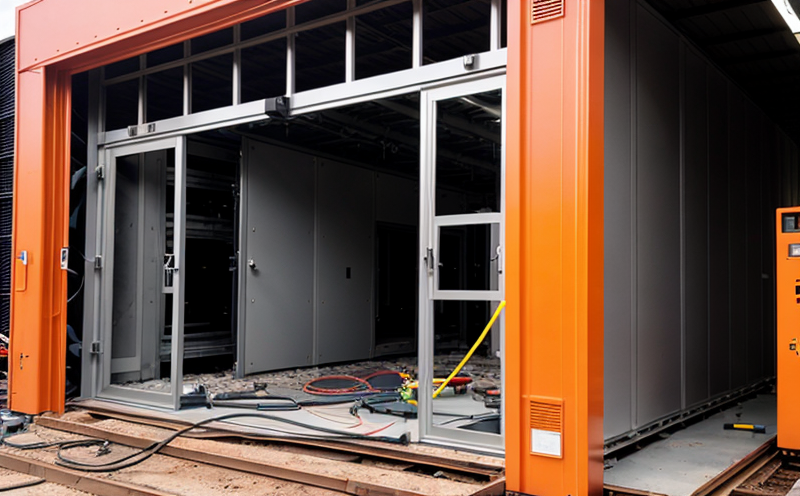SAE J2289 Thermal Safety Testing of EV Battery Modules
The SAE J2289 standard is a critical benchmark in the automotive industry, focusing on ensuring that electric vehicle (EV) battery modules are safe and reliable under extreme thermal conditions. This testing protocol evaluates the thermal stability and safety margins of battery packs to prevent potential hazards such as overheating, short circuits, or fire.
SAE J2289 is particularly important for manufacturers who must comply with stringent safety regulations and ensure that their products are fit for purpose in real-world driving conditions. By conducting this testing, we help clients meet the rigorous requirements set by automotive standards organizations like SAE International, ensuring that battery modules can withstand high temperatures without degrading performance or posing a risk to passengers.
The process involves controlled thermal cycling and monitoring of various parameters such as temperature distribution within the battery module, internal resistance changes, and voltage stability. This comprehensive approach ensures that any potential weaknesses in design are identified early on, allowing for improvements before mass production begins.
Our team uses advanced instrumentation to monitor these variables continuously throughout testing cycles. We employ sophisticated software solutions to analyze data points collected during each trial run, providing detailed reports that outline areas where further optimization might be necessary.
To prepare specimens for SAE J2289 testing, we follow strict guidelines provided by the standard itself. This includes ensuring that all components are correctly assembled according to manufacturer specifications and that any external heat sources used in testing replicate realistic operating conditions as closely as possible.
Our laboratories are equipped with state-of-the-art equipment capable of simulating diverse environmental scenarios, from arctic cold to scorching hot climates. By subjecting battery modules to these varied environments, we can assess their resilience against temperature extremes and identify potential points of failure early on in development stages.
The importance of SAE J2289 thermal safety testing cannot be overstated given the rapid growth of electric vehicles worldwide. As more countries implement stricter emission controls and fuel efficiency standards, ensuring that EV battery packs are safe becomes increasingly crucial.
Applied Standards
The SAE J2289 standard is widely recognized in the automotive industry for its stringent criteria regarding thermal safety testing of electric vehicle (EV) battery modules. Below are some key international standards that complement and support this particular protocol:
- SAE J2289 R01 - Recommended Practice for Thermal Safety Testing of Electric Vehicle Battery Modules
- ISO 12405-2:2017 - Road vehicles - Environmental conditions and test procedures for batteries, battery packs and associated equipment - Part 2: Thermal abuse tests
- ASTM G39-18 - Standard Practice for Testing of Lithium-Ion Cells and Batteries for Electrical Energy Storage in Electric Vehicles
These standards work together to establish a comprehensive framework for assessing the thermal performance of EV battery modules, ensuring they meet industry expectations regarding safety and reliability.
Scope and Methodology
| Test Parameter | Description |
|---|---|
| Temperature Range | -40°C to +85°C |
| Humidity Levels | 20% RH to 93% RH |
| Test Duration | At least 72 hours per cycle |
| Data Collection Points | Every 15 minutes during each phase of the test |
The scope of SAE J2289 thermal safety testing encompasses evaluating how well a battery module can handle extreme temperatures without compromising its integrity or performance. Key metrics monitored include temperature rise within individual cells, overall module temperature distribution, internal resistance variations, and changes in terminal voltage.
Methodologically speaking, the process involves placing the battery module into an environmental chamber that allows precise control over both temperature and humidity levels. Once set up, the system subjects the unit to predefined sequences of heating and cooling cycles designed to mimic real-world driving conditions.
Benefits
Enhanced Safety: Identifies potential risks early in development stages, reducing the likelihood of accidents involving EVs.
Regulatory Compliance: Ensures adherence to global automotive safety regulations and industry best practices.
Predictive Maintenance: Provides insights into long-term durability and reliability of battery modules through detailed thermal analysis.
Quality Assurance: Offers a robust methodology for verifying the quality of materials used in manufacturing EV batteries.
Incorporating SAE J2289 thermal safety testing into your product development process can significantly enhance the reputation and marketability of your brand. It demonstrates commitment to innovation while maintaining high standards of safety and performance.





